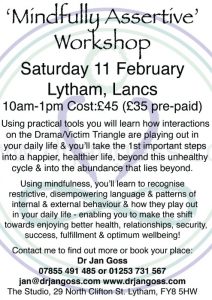Headspace & Heartspace
Quite often when we come to mindfulness we are looking for that elusive ‘headspace’ that we may have heard about. Lots of us think we are the only one for whom it is difficult to generate some space between our thoughts, to turn off the non-stop thinking that is the soundtrack to a frenetic life. This was certainly one of the reasons I began meditating, almost 20 years ago. My life was extremely stressful, as the owner and front-of-house of a Michelin-listed restaurant (here is a link to my story: website or view the video below). Upon reflection of course I can see that as difficult as life was back then, all that I went through, is responsible for bringing me to where I am now, and the work of enabling others to become calmer and quieter inside.
My own ‘story’ is a reminder that the difficulties we face in life and struggle to come to terms with, are often the very events that turn our lives around. Even in that frantic mind, there was a part of me that was very clear that if I wanted my life to change for the better, I needed to take full responsibility to change. In time, we can begin to embrace the difficulties because we see their value, as we step back and look at the bigger picture of our lives. Mindfulness helps us to re-frame our histories, to come to terms with, and embrace them, and bring us to a happier, more peaceful place.
Headspace is important, it contributes to our mental and emotional resilience. It allows us to gain the clarity we need to be truly creative (in all of its aspects). The quiet it gives us ensures that when our head touches the pillow at night, our eyes don’t ping open as our mind springs to life, anxiously poring over all that we have and haven’t done today, and might or might not do tomorrow. Headspace allows us to close our eyes and gently drift off to sleep and remain there for a good 6 – 8 hours as our body repairs and rejuvenates itself.
Creating headspace is part of mindfulness and we value it because there is a direct correlation between that and our own wellbeing. It is blatantly obvious to us. We may not have thought about it until we come to practice mindfulness, but heartspace is equally important. When we create space in our heart, we offer kindness to our self and others, and this too, turns lives around. Mindfulness cajoles us into looking beyond the surface of life, to see the ethics (or lack thereof) of how we ‘consume’, whether we are consuming mindfully or not, aware of the effects on the Earth and other beings.
Through mindfulness, eventually we have to come to the point of re-evaluating our priorities and values, through observing the process of cause and effect. Mindfulness enables us to cultivate love and compassion, understanding and forgiveness, it heals at the deepest of levels, at the heart, if we are prepared to open our self to it and allow it to work it’s ‘magic’.
Of course we may not be ready for the full extent of the journey right now. That too, is ok, we need to be kind to our self. At times, it is easy to get caught in the false ‘comfort’ of discomfort, playing out the same behaviours through the decades of our life, not prepared to step off that worn out record. It takes time and courage to do so and it takes kindness and compassion above all else.
First and foremost we have to create heartspace for our self, to nurture our bodymind as a unified, intelligent entity, understanding it isn’t separate but intricately interwoven with the full and entire fabric of life. In the words of mindfulness teacher Thich Nhat Hanh, everything ‘inter-is’! In other words, everything is interconnected, so nurturing our self is nurturing the whole of life.
Headspace and heartspace too, are not separate, they ‘inter-are’!


